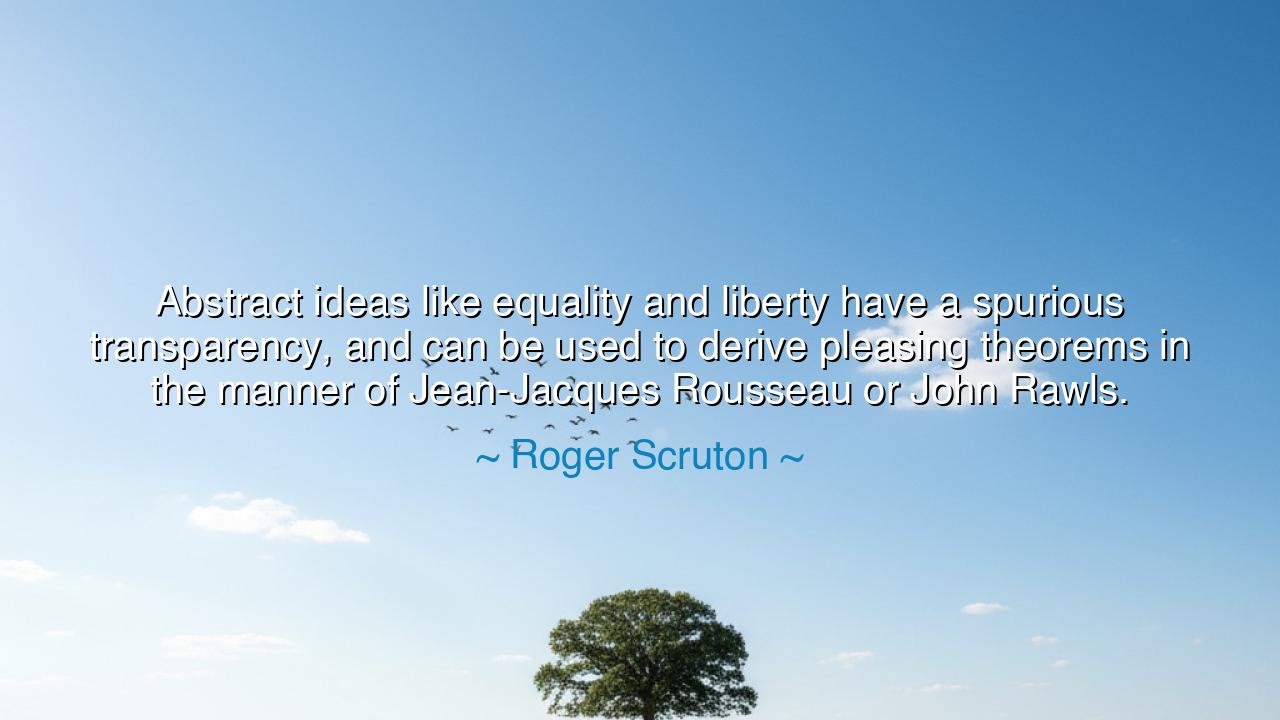
Abstract ideas like equality and liberty have a spurious
Abstract ideas like equality and liberty have a spurious transparency, and can be used to derive pleasing theorems in the manner of Jean-Jacques Rousseau or John Rawls.






Hear, O Children of the Future, the words of Roger Scruton, who speaks with the voice of caution and wisdom: "Abstract ideas like equality and liberty have a spurious transparency, and can be used to derive pleasing theorems in the manner of Jean-Jacques Rousseau or John Rawls." In these words, Scruton warns of the dangers that lie in the seductive appeal of abstract ideas—concepts that seem simple, transparent, and self-evident, but which, when examined more closely, reveal their complexity and their potential for manipulation. Equality and liberty are ideals that inspire the heart and the mind, but they are also slippery and can be twisted into justifications for actions that may not lead to true justice or freedom.
In the ancient world, philosophers often warned of the perils of abstract thinking divorced from the realities of human life. Socrates, the great Greek philosopher, challenged the notion that ideas could be easily separated from practical wisdom. To Socrates, virtue was not something to be theorized about in the abstract, but something that must be lived, something that must be anchored in real-world experience. In Plato’s "Republic", Socrates pushes us to recognize that ideas like justice, equality, and liberty cannot be separated from the lived experience of society, and that they must be rooted in the practical structures of governance, community, and individual character. Yet, even in Plato’s dialogues, the concepts of equality and justice were often debated, revealing the deep complexities of these ideas, complexities that Rousseau and Rawls would later explore in their own work.
Jean-Jacques Rousseau, in his famous work "The Social Contract", proposed a vision of society where individual freedom could be harmonized with the general will, a collective pursuit of the common good. However, Rousseau's ideal, while powerful in its call for equality, also led to the justification of state-driven action that could suppress the individual in the name of the collective. Scruton warns us that abstract ideas like liberty can be turned into tools for control, and Rousseau’s vision of freedom was sometimes used to justify authoritarian rule, claiming that true freedom was only possible when it was aligned with the will of the collective. This tension between individual liberty and state control remains one of the most contentious debates in political philosophy—a debate that Scruton points to in his critique.
Similarly, John Rawls, in his influential work "A Theory of Justice", outlined a theory of justice based on the idea of the veil of ignorance, where society's principles would be determined as if individuals did not know their own position in society. The principle of justice as fairness was designed to ensure that inequalities would only be permitted if they benefited the least advantaged members of society. While Rawls’ theory was designed to promote equality and fairness, Scruton suggests that such abstract theories can become detached from the messy realities of human nature and the specific moral commitments that define a particular society. The danger lies in the idea that such theories can be wielded as tools of moral authority, dictating what is just or fair without considering the deeper complexities of lived experience and historical context.
The lesson of Scruton’s words is clear and profound: abstract ideas like equality and liberty may seem straightforward, but they carry the risk of being used to justify actions and systems that are disconnected from the lived experience of individuals. They are concepts that can be manipulated, twisted, and applied in ways that serve the interests of the powerful. Just as Rousseau’s ideal of the general will could be used to justify the suppression of individual rights, so too can Rawls’ principles be weaponized in ways that mask deeper inequalities and fail to take into account the moral complexities of human society. Scruton’s warning calls for a deeper, more cautious approach to these ideals, recognizing their potential for misuse if not grounded in the realities of human life and society.
In your own life, beware of simplistic answers to complex questions. Equality and liberty are powerful ideals, but they must be examined carefully and applied thoughtfully. Question the motives of those who wield these ideas as tools for political or social change. Are they seeking true freedom for all, or are they using abstract ideals to justify control and coercion? The challenge is to navigate between the idealism of philosophical theories and the practical wisdom needed to shape a fair and just society. Just as Socrates questioned the supposed wisdom of his time, so too should we question the ways in which equality and liberty are used to shape the world around us.
The wisdom of Scruton’s critique lies in its call to recognize that ideas are never neutral. They are shaped by the context in which they are applied and the individuals who wield them. Let this lesson guide you, O Children: Do not allow abstract ideas to obscure the real human consequences of political decisions. Seek not only to understand theories of justice but to understand how those theories shape the world of the living. May you hold fast to the principles of equality and liberty, but may you also be wise enough to know when they are being used to further noble purposes or to mask deeper injustices. The task is not merely to adopt ideas, but to question, refine, and apply them in ways that create a truly just society.






AAdministratorAdministrator
Welcome, honored guests. Please leave a comment, we will respond soon